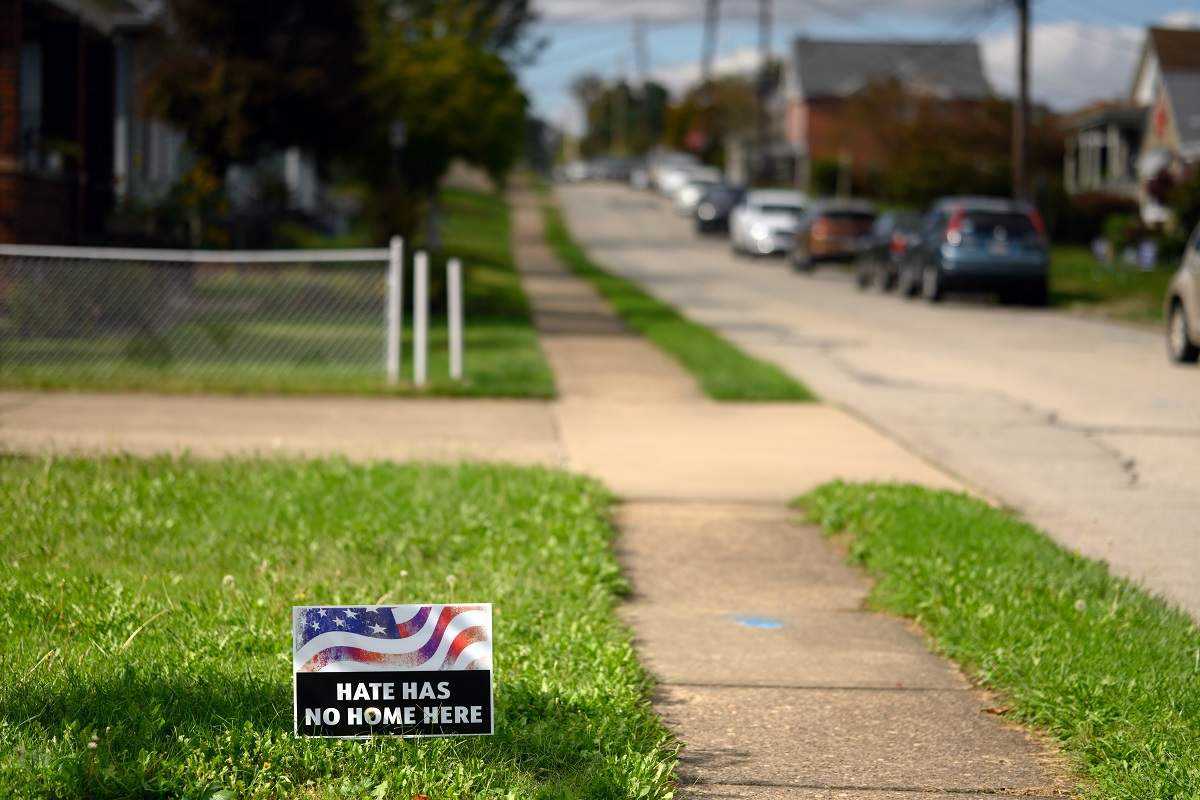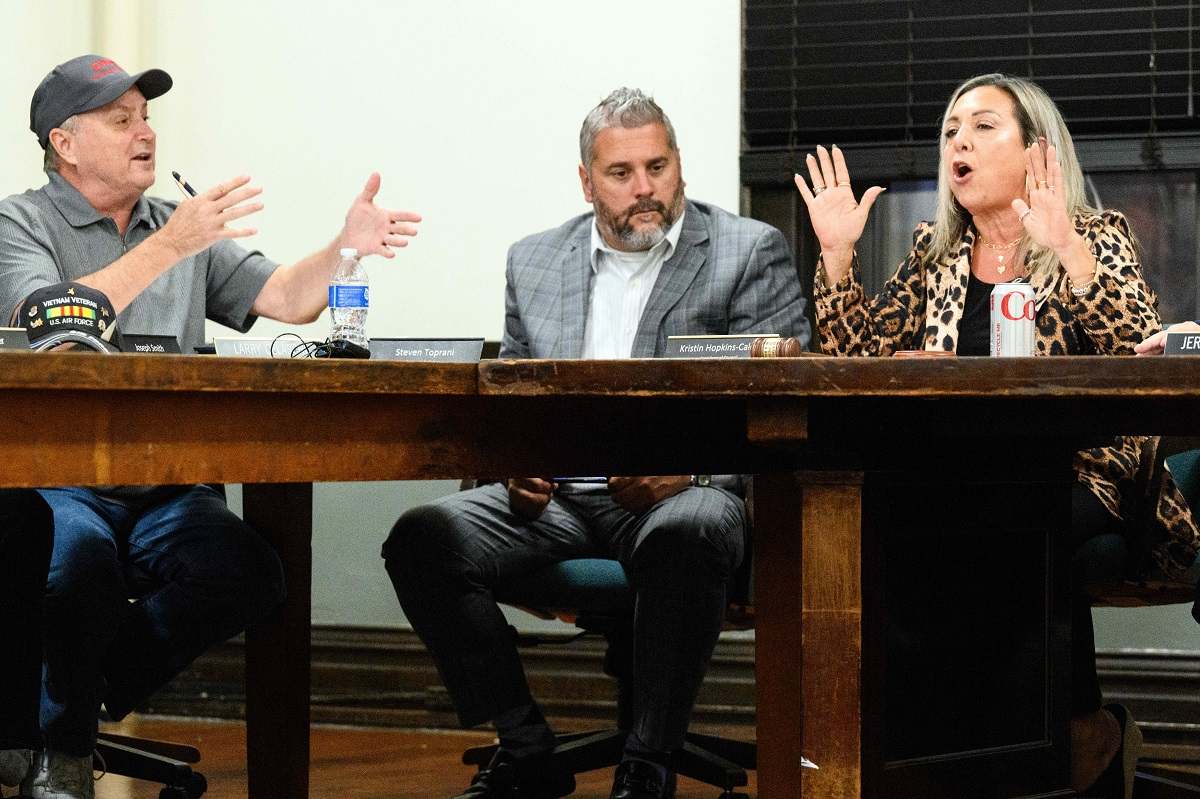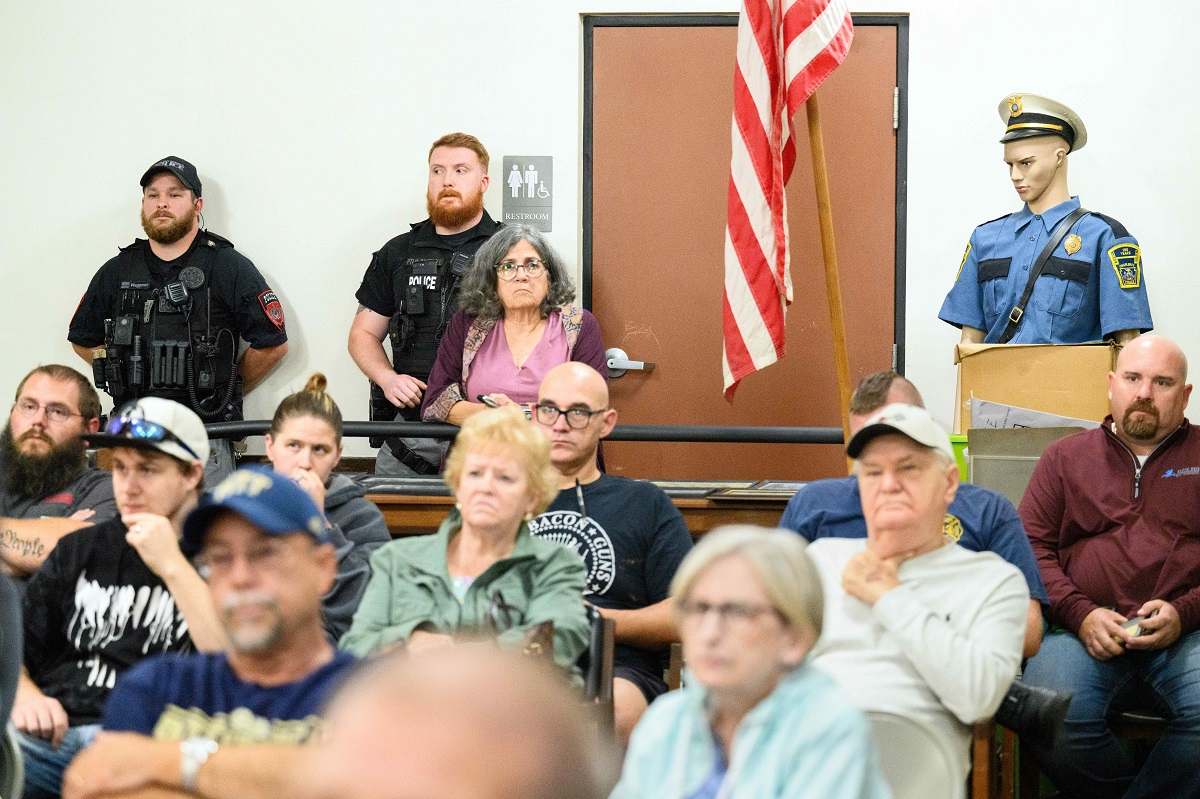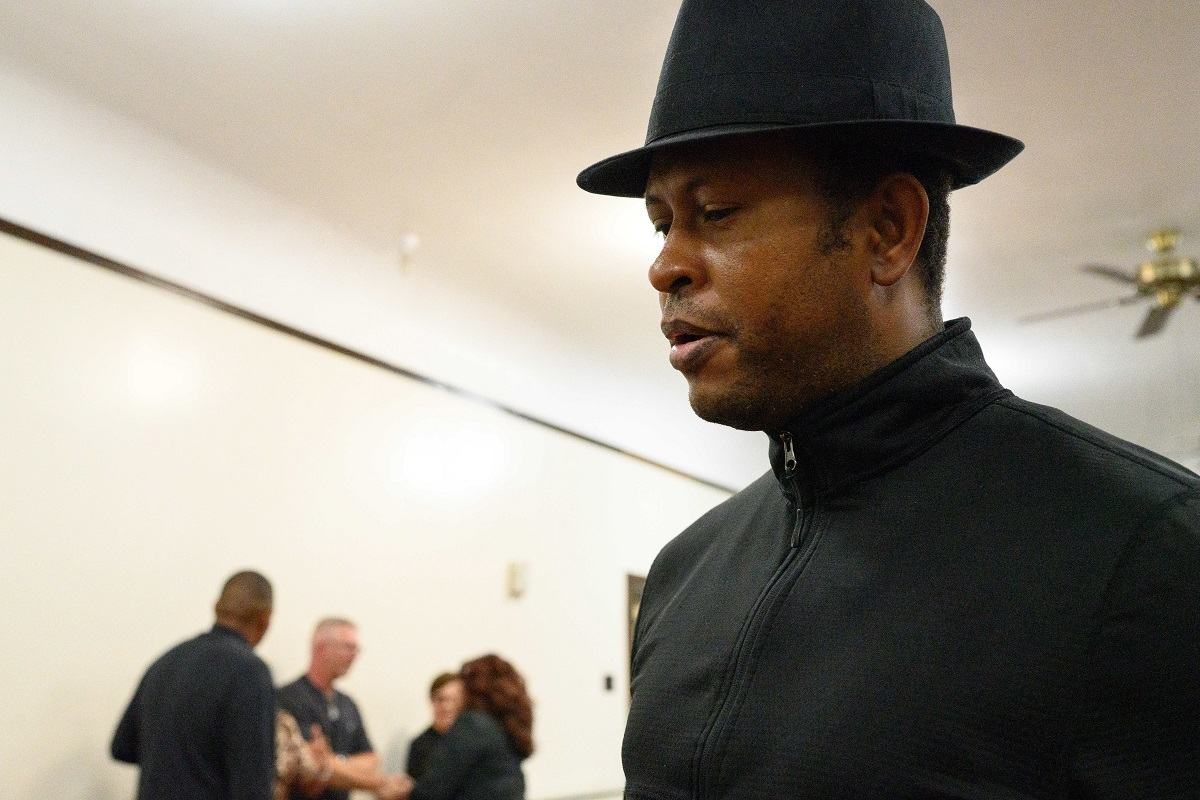
Former president Donald Trump’s comments on Charleroi prompted Sarah Slates and her partner to put up this sign.
16:35 JST, October 10, 2024
CHARLEROI, Pa. – Donald Trump was eager to tell a new horror story about this tiny Rust Belt borough where hundreds of Haitians arrived in recent years to fill factory jobs. “Have you heard of it?” he asked, introducing a place that would become part of his anti-immigrant closing argument.
“The town is virtually bankrupt,” Trump continued at a recent rally. (It wasn’t.) “This flood of illegal aliens is also bringing massive crime,” he said. (They weren’t, and they have at least temporary authorization to live in the United States, town and factory officials said.) “Char-le-roi, what a beautiful name. But it’s not so beautiful now.”
The Republican presidential nominee had sketched a misleading caricature. But he also tapped into real tensions and a powerful anger in Charleroi and far beyond – stemming from a widespread conviction that America did too much for newcomers and not enough for citizens.
“I don’t believe everything he says, but I don’t think America has the resources to keep helping outside people,” said Charleroi resident Leighanna Girvin, 33.
“That’s why I’m going to vote for Trump,” she added – her first-ever vote for president.
Trump is concluding his third-straight White House run with a heavy focus on vilifying immigrants for many of the country’s problems – regardless of the facts. He has spread misinformation about Venezuelan gangs taking over residential buildings in Aurora, Colo., and racist, inaccurate tropes about Haitians eating cats and dogs in Springfield, Ohio. Charleroi is one of the most recent examples of Trump’s anti-immigration message in action – its distortions, its collateral damage and its political resonance.
Interviews with three dozen voters show his pitch is appealing to many in the town and surrounding Washington County, Pa. – a red stronghold in a state that both parties view as a likely tipping point in the presidential race. It has also angered some residents and inflamed an ugly discourse scattered with baseless claims about illegal voting and a “great replacement” of native-born Americans.

Larry Celaschi, left, and Kristin Hopkins-Calcek argue on Oct. 2 during a council meeting for the borough of Charleroi, Pa.
“The use of our citizens and residents as political talking points is unacceptable,” Charleroi Borough Council President Kristin Hopkins-Calcek said at a recent tense meeting where a shouting match erupted. Hopkins-Calcek has blamed Trump for “divisive rhetoric” about the town aimed at “political gain.”
Immigration is Trump’s major focus in the final weeks of the campaign, with polls showing Democratic nominee Kamala Harris narrowing Trump’s longtime advantage on another top issue, the economy. Americans have grown more opposed to undocumented immigration in recent years and also more skeptical of diversity, data show. A CNN survey conducted last month found a majority of Republicans support the idea that growing racial and ethnic diversity in the United States is mostly threatening to American culture; a third of independents agreed.
“We brought life to the community. We don’t do no harm to anyone,” said Evency Dorzelma, 42, who worked as a police officer in Haiti before coming to Charleroi. “So, there is no reason to fear us. There is no reason for this fearmongering, this racism campaign.”
Trump is vowing to carry out the largest deportation of undocumented immigrants in U.S. history and stop what he calls an “invasion.” He claims without evidence that foreign countries are freeing violent inmates to send them to the United States, and he attacks immigrants in dehumanizing terms, accusing them of “poisoning the blood” of the country.
Voters trust Republicans over Democrats when it comes to the border, polls show, and the Trump campaign is seeking to elevate the issue, including through ominous images of tattooed gang members on billboards at rallies, saying they will take over neighborhoods if Harris wins. Stephen Miller, Trump’s immigration adviser, is playing a significant role in the final weeks of the campaign.
The Trump campaign saw some upside even to the widely criticized comment about cats and dogs, according to one adviser, who spoke on the condition of anonymity to discuss private conversations. While some advisers grew concerned that the campaign could not find substantive proof for the allegations – they hunted for several days after Trump made them – Trump had opened the door to broader topics his team wants to raise. “Maybe the dogs and cats are stupid,” this person said, “but the immigrants coming in and hurting your community, that’s an issue for us.”
Dave Barbe, whose company employs many of the immigrants in Charleroi, said many are authorized to live and work in the United States through U.S. programs meant to temporarily allow foreigners from certain troubled countries, including Haiti, on humanitarian grounds. The government has offered “temporary protected status” to certain immigrants already in the United States, regardless of how they entered – and has also given many Haitians authorization to travel to the United States through something called “parole.” Trump and his running mate, JD Vance, have criticized those programs: Trump promised in a recent interview to revoke temporary protected status.
Trump is headed to Aurora on Friday and wanted to visit Springfield, but a trip there has not yet happened.
Trump campaign spokeswoman Karoline Leavitt said in a statement that the former president will continue highlighting “the failed immigration system,” and if returned to office will “secure our border, deport those who illegally entered our country, and put an end to the chaos that illegal immigration has brought to many communities across the country.”
In Charleroi, about 30 miles south of Pittsburgh, some leaders blame Trump for increased discord in their community. But others welcome the attention. Council member Larry Celaschi said he contacted Trump’s campaign weeks before Trump publicly mentioned the town with a simple message: “We are your narrative here in Charleroi, Pennsylvania.”
Celaschi invited Trump to visit and re-upped the suggestion recently.
‘We’re at a fever pitch’

Residents attend the Oct. 2 meeting of the Charleroi Borough Council.
On Sept. 11 – the day after Trump told a prime-time debate audience that immigrants in Springfield were “eating the cats” and “eating the dogs” – Charleroi Borough Manager Joe Manning wrote an email to the Springfield city manager.
Manning said he could empathize.
Charleroi – population 4,234 in the 2020 census – is a small-scale version of Springfield: About 2,000 immigrants, including 700 Haitians, live in the area, authorities say. Many of them arrived in the past couple of years, recruited by a local food production company that needed to fill jobs in a region drained by decades of economic decline. A once-booming shopping district has given way to faded low-traffic storefronts, and just last month the operator of a major glass plant announced plans to close.
Even people critical of the immigration influx have nice things to say about the newcomers. “The truth is these people are not bad people,” said Sean Logue, chair of the Washington County Republican Party. “They’re not committing crimes. They’re not eating cats and dogs. They are hardworking. They go to church.”
But the rapid visible change has still drawn backlash. In interviews, some residents said they try not to go downtown now – worried about crime even though city officials say the newcomers have not caused any spike. Traffic accidents involving immigrants have amped up tensions, and public schools have had to accommodate a sudden jump in the number of students learning English as a second language.
Ed Zelich, superintendent of the Charleroi Area School District, noted funding has increased along with the student population and said he’s proud of how staff have worked to meet new needs. But some longtime residents worry the learning environment for their own children has suffered.
A council meeting last week began with a complaint about the immigrants. The first woman to take the lectern never said exactly who she was talking about, but it was clear what she meant.
“They think they’re better than us, and they’re not,” she told roughly 40 people who showed up to watch, assembled in a small room downtown just a short walk from immigrant-owned storefronts.
A man got up to ask that Charleroi compile a central hub of information on the immigrants – a place for citizens to get the facts “instead of all the rumors and innuendo.”
“That, I think, will go a long way with helping the citizens calm down,” the man said. “Because right now we’re at a fever pitch.”

Evency Dorzelma, a Haitian immigrant, attends the Oct. 2 council meeting.
A block away, at Queen’s Market, Luciano Janvier was thinking about writing an essay to explain to people: “We are all immigrants.” He left Haiti shortly after the assassination of the country’s president in 2021 and said of Trump’s comments about eating pets: “It’s a kind of stigmatization.”
Queen’s Market is owned by Augusta Goll, who is originally from Liberia and said Charleroi was “a ghost town” when she moved there in 2019 from Arizona.
“We open businesses; we pay taxes; we’re contributing to the good for the city,” she said.
Goll is a U.S. citizen who voted for Trump in 2016, she said, because she is a Republican. But his rhetoric on immigrants has repelled her. She declined to say how she will vote this fall.
Her message to Trump: “You have an immigrant wife!”
‘Our country has to come first’
In interviews, some Washington County voters struggled to explain why seeing immigrants around unsettled them. They just knew it gave them pause.
“I have nothing against them,” said Bill Welch, who is in his 50s. “It’s just -”
He stopped.
“They’re just – ”
Another long pause.
“I don’t know,” he said. “It’s hard to explain. I’m old school.”
Trump signs dot the front yards in Charleroi, outnumbering the occasional nod to “Harris-Walz.” Factory workers raised as Democrats have drifted away and rallied around Trump.
Valerie Urwin, 57, who lives just down the road in Speers, said she switched from Democrat to Republican just a year and a half ago but has been voting for GOP candidates for much longer.
“Our country has to come first,” she said. “You can’t, like, spread the wealth to other countries when you’re putting us in the hole.” She kept bringing up her daughter: “A single mom working her butt off” and making “maybe $19,000 a year” at Taco Bell.
Conservative media and influencers have zeroed in on Charleroi since Trump mentioned it, often fanning unfounded claims. A YouTuber with a million subscribers filmed Logue, the Republican Party chair, baselessly speculating that “Obama phones” direct immigrants to swing states where they can help Democrats win elections.
The popular account Libs of TikTok recently shared a YouTube video about Charleroi with the caption “Great job Replacement is playing out in a small PA town as migrants take native jobs at food plants” – an allusion to “great replacement theory,” the baseless conspiracy theory that elites – sometimes Jews, minorities and immigrants – are attempting to replace White, native-born Americans through immigration and higher fertility rates.
The conspiratorial claim has a long history of inspiring racist attacks. But a large share of voters – nearly half of Republicans, by some counts – say they are concerned there is a deliberate effort to replace Americans, and Washington County is no exception.
“It is not a crazy idea,” Logue said of a “great replacement,” which he described as an intentional effort to bring in “the young population from the Third World.” In Charleroi, he said, “instead of having a neighbor as family you’ve known for decades, you’re getting a rental property filled with Haitians who speak a different language and have an absolutely different culture. And so, it’s causing issues.”
Others residents are eager to send a different message. Trump’s comments on Charleroi prompted Sarah Slates, 38, and her partner to put up a small lawn sign. “Hate Has No Home Here,” it says below a picture of an American flag, on a block of houses scattered with tributes to the Republican nominee.
“Any time there’s change in a community, there’s going to be tension,” Slates said. “The community changes, but that’s not a bad thing.”
“Charleroi,” she said, “is still a beautiful place.”
Top Articles in News Services
-

Survey Shows False Election Info Perceived as True
-

Hong Kong Ex-Publisher Jimmy Lai’s Sentence Raises International Outcry as China Defends It
-

Japan’s Nikkei Stock Average Touches 58,000 as Yen, Jgbs Rally on Election Fallout (UPDATE 1)
-

Japan’s Nikkei Stock Average Falls as US-Iran Tensions Unsettle Investors (UPDATE 1)
-

Trump Names Former Federal Reserve Governor Warsh as the Next Fed Chair, Replacing Powell
JN ACCESS RANKING
-

Producer Behind Pop Group XG Arrested for Cocaine Possession
-

Japan PM Takaichi’s Cabinet Resigns en Masse
-

Man Infected with Measles Reportedly Dined at Restaurant in Tokyo Station
-

Israeli Ambassador to Japan Speaks about Japan’s Role in the Reconstruction of Gaza
-

Videos Plagiarized, Reposted with False Subtitles Claiming ‘Ryukyu Belongs to China’; Anti-China False Information Also Posted in Japan


























